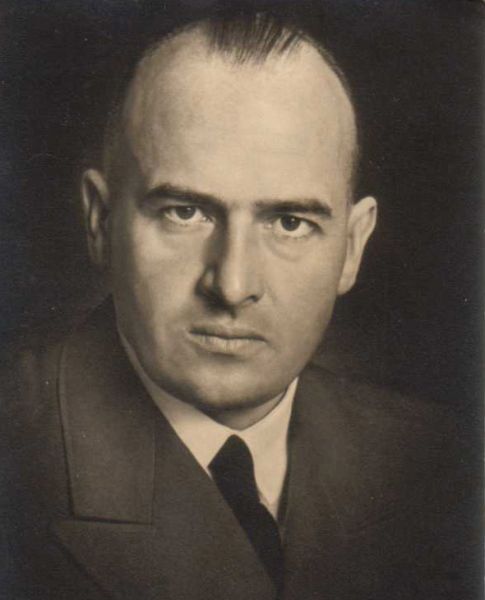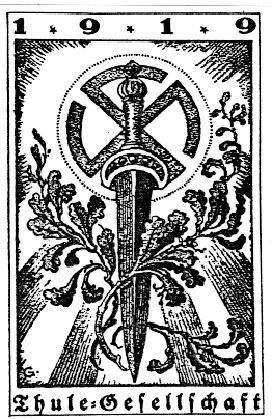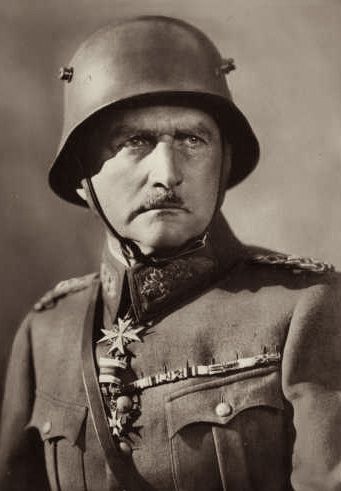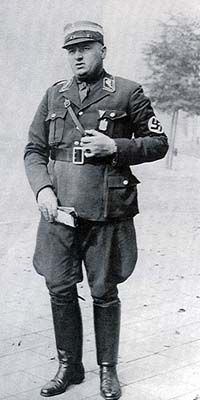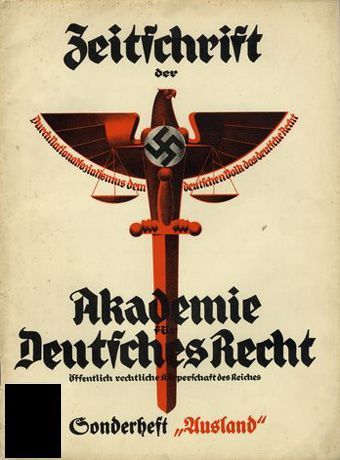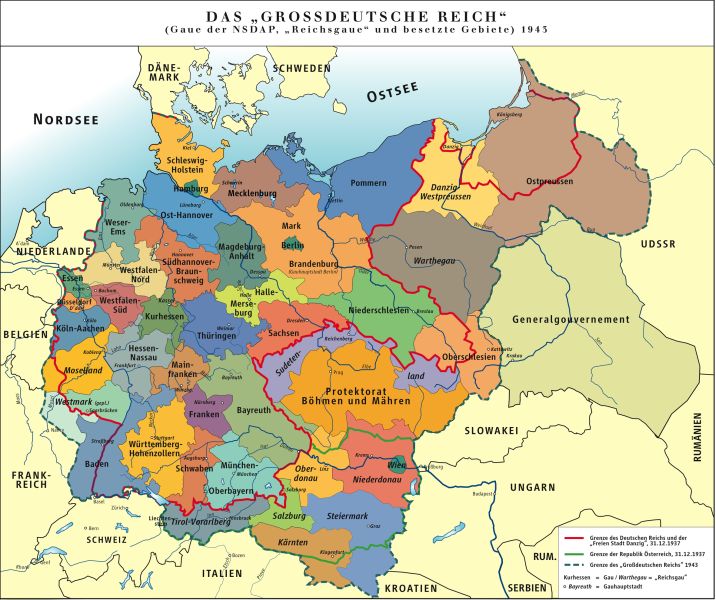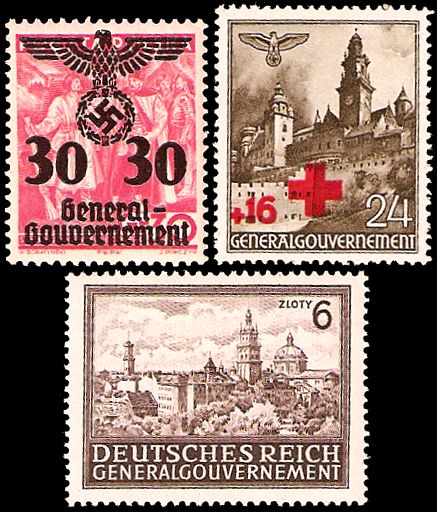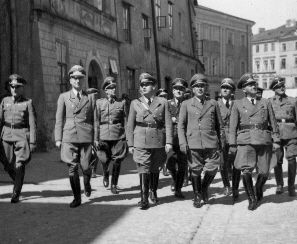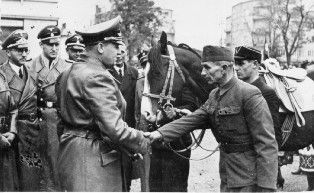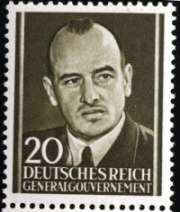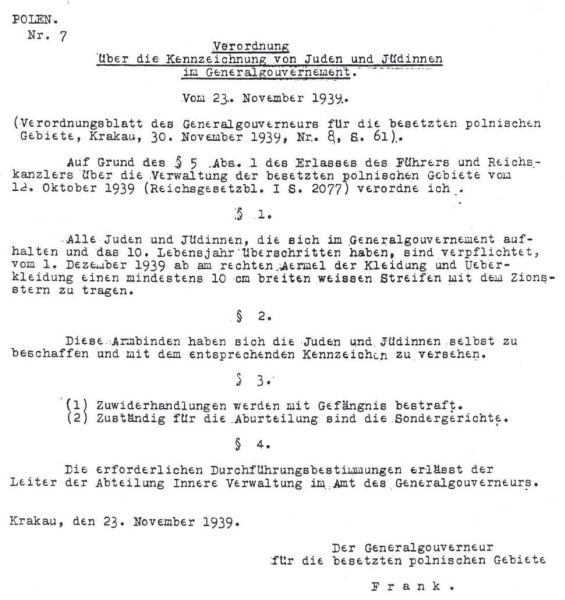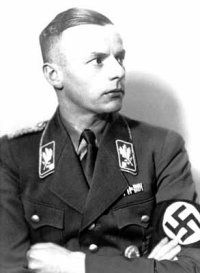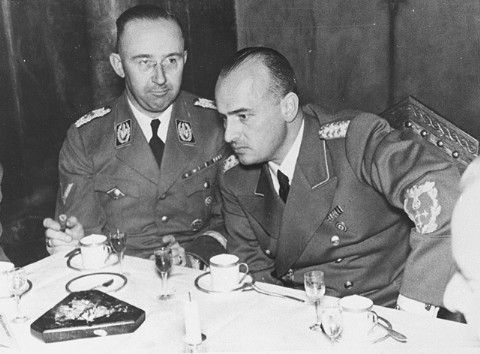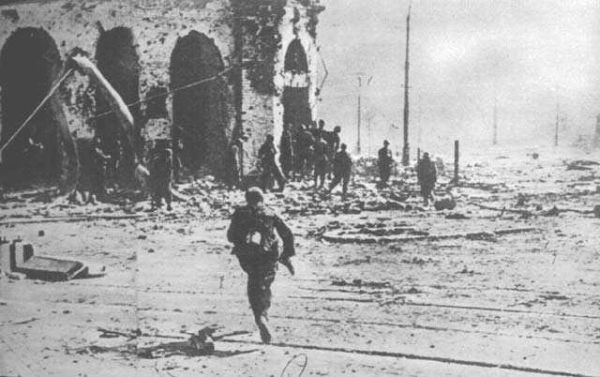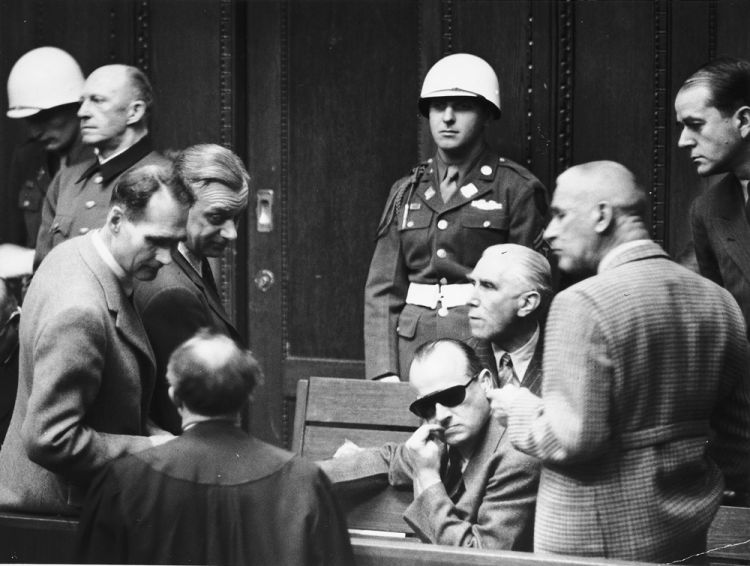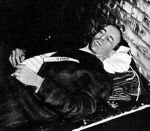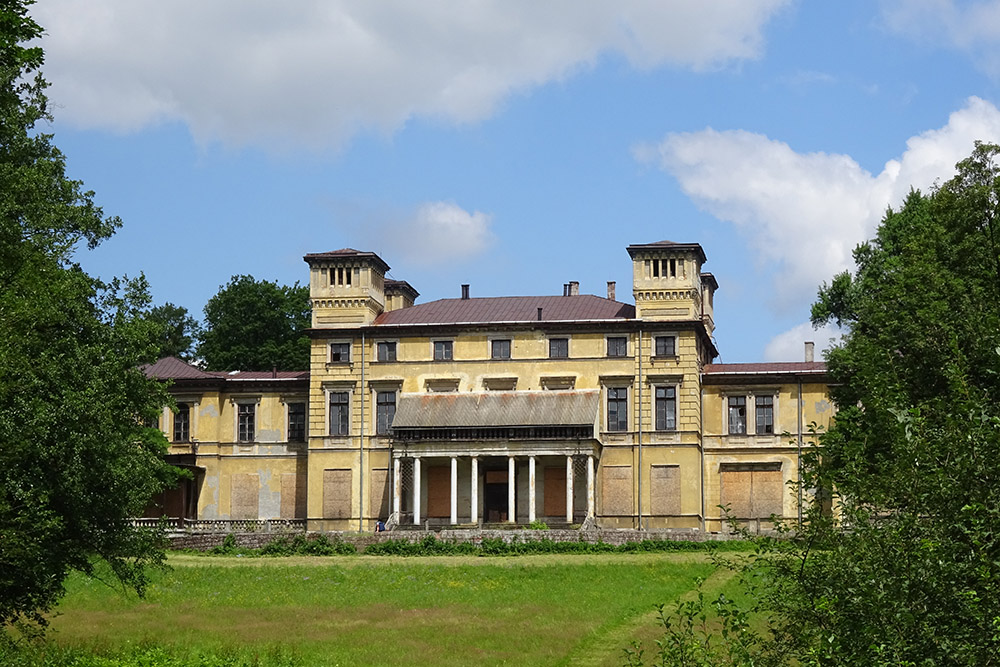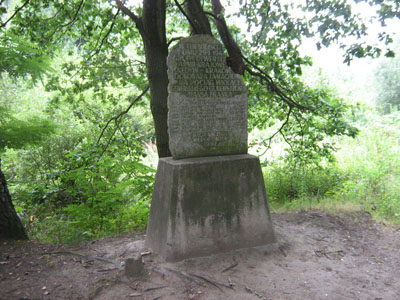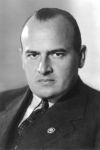Introduction
The name of Hans Frank is irrevocably tied to the crimes which have been committed by the Nazi regime in the so called General Government, the part of Poland that enveloped the largest part of Polen that was taken by the Germans in 1939. The area was not annexed by Germany but placed under German civil administration headed by Frank. Frank was a lawyer who was fiercely dedicated to the National socialist cause, before and during World War Two. Prior to the outbreak of the war, Frank was the leading Nazi lawyer and the most prominent theoretician and policy maker in the field of the theory of law within the Third Reich.
As Generalgovernor he earned the nickname "butcher of Poland". He was the executor of the German occupation policy in the area in which he exerted his administrative powers. Initially, the Generalgovernment was to serve as a reservation for Poles and a pool of large numbers of forced labourers. The region was systematically robbed clean and was the stage for mass murder on a scale hitherto unheard of. Under Frank’s administration, hundreds of thousands of Poles were murdered, their belongings confiscated and about one million Polish labourers were deported to Germany for the benefit of the armaments industry. Apart from that, he organised the removal of the Polish Jews to the ghettos in the run up to the Holocaust.
Definitielijst
- Holocaust
- Term for the destruction of European Jewry by the Nazis. Holokauston is the Greek term for a completely burnt sacrifice.
- Jews
- Middle Eastern people with own religion that lived in Palestine. They distinguished themselves by their strong monotheism and the strict observance of the Law and tradition. During World War 2 the Jewish people were ruthlessly persecuted and annihilated by the German Nazis. . An estimated 6,000,000 Jews were exterminated.
- Nazi
- Abbreviation of a national socialist.
Images
Childhood and study
Hans Michael Frank was born May 23rd, 1900 in Frankfurt, the son of lawyer Karl Frank and Magdalena Buchmaier. He was the second of three children, he had an elder brother Karl jr. and a younger sister Elisabeth. After graduation from grammar school he was drafted for military service in June 1918. As the First World War ended in November that year, he did not participate in combat.
After military service, he studied science of economics and law at the universities of Munich, Vienna and Kiel from 1919 onwards. As a student, Frank was already active politically in more or less obscure extreme rightwing political splinter movements in Munich. So, in 1919, he joined the Deutsche Arbeiterpartei (D.A.P. German Workers Party) which focused mainly on rebuilding Germany’s military strength after the war that had been lost. The following year, partly from the D.A.P., the Nationalsocialistische Deutsche Arbeiterpartei (N.S.D.A.P. Nationalsocialist German Workers Party) under Adolf Hiltler was founded. Frank however did not join that party at the time. Not only political parties could enjoy Frank’s attention in those days. In 1919 he joined the Thule-Gesellschaft, an anti-Semitic and rightwing extremist organisation that actively resisted the communist Munich city council. Moreover in 1920, he became a member of the Freikorps of Franz Ritter von Epp which was involved in the overthrow of the communist radenrepublic in Munich.
The fact that Frank was formally not a member of the N.S.D.A.P. did not prevent him from being legal advisor of the party from 1920 onwards. In this capacity he represented the party in more than 2.400 cases. This brought him in conflict with fellow lawyers more than once. One of them yelled at him in court once: "I beg you, do abandon these people (the Nazis). Nothing good will come of it. Political movements that start in penal court will end up in penal court one day". A man with foresight.
In 1923, Frank joined the Sturmabteilung (SA, stormtroopers) and participated in the failed so called Bierhalleputsch (beer cellar revolt) of November 8th, 1923. This was an attempt by Hitler to violently overthrow the Bavarian government. In the Bürgerbräukeller in Munich, a number of Bavarian principals were having a meeting and Hitler barged in with his SA raiders. The principals were arrested and commotion erupted in the streets of Munich. This led to a shooting in the Residenzstrasse were Hitler and his followers were arrested. Frank however managed to make his way to Austria and continued his studies in Vienna. After his prosecution had been lifted in 1924 he returned to Germany, taking his degree in law in Kiel in the same year.
Frank completed his study of law in 1926 when he passed the state examination in law. Subsequently he started work in the law office of his father in Munich. He succeeded his father after the latter had been barred from practising law because of financial fraude. Later on, Frank stated about this period: "Since 1920 I have dedicated my work to the N.S.D.A.P. I have participated in the events of November 1923 as a National socialist. For this I was awarded the Blutorden. After the resurrection of the movement in 1926, I expanded my activities for the movement and initially I became part time and later almost full time legal advisor to the Führer and the Reichsleitung of the N.S.D.A.P. In that way I was the representative of the juridical interests of the upcoming Third Reich, ideologically as well as practically. (…) In this way I was, I am and will always remain the most important lawyer throughout the period of struggle of national socialism".
Definitielijst
- Blutorden
- “Blood Order”. German decoration awarded in 1934 to those members of the NSDAP who had participated in the Bierhalleputsch of 1923.
- First World War
- Took place from 1914 till 1918 and is also named The Great War. The conflict started because of increased nationalism, militarism and neo-colonialism in Europe. Two alliances battled one another during the 4-year war, which after a dynamic start, resulted into static trench warfare. The belligerents were the Triple Alliance (consisting of Great-Britain, France, and Russia; later enlarged by Italy and the USA, amongst others) on the one hand and the Central Powers (consisting of Germany, Austria-Hungary, Bulgaria and the Ottoman empire) on the other hand. The war was characterized by the huge number of casualties and the use of many new weapons (flamethrowers, aircraft, poison gas, tanks). The war ended in 1918 when Germany and its allies surrendered unconditionally.
- Freikorps
- German paramilitary units established directly after the Great War by former front soldiers. These groups were often named after their commander. Freikorps formed the basis of the eventual SA or Sturmabteilung.
- Führer
- German word for leader. During his reign of power Adolf Hitler was Führer of Nazi Germany.
- national socialism
- A political ideology drawn up by Hitler based on the superiority of the German race, the leader principle and fierce nationalism that was fed by the hard Peace of Versailles. National socialism was anti-democratic and racist. The doctrine was elaborated in Mein Kampf and organised in the NSDAP. From 1933 to 1945 National socialism was the basis of totalitarian Germany.
- socialism
- Political ideology aiming at slight or no class differences. Means of production are owned by the state. Evolved as a response to capitalism. Karl Marx tried to substantiate socialism scientific.
- Sturmabteilung
- Storm detachment. Semi-military section of the NSDAP. Founded in 1922 to secure meetings and leaders of the NSDAP. Their increasing power was stopped during “The night of the long knives”, 29 and 30 June 1934.
Images
The juridical leading light of the NSDAP
From 1927 onwards, Frank made a lightning career within the ranks of the N.S.D.A.P. That year, the party district Berlin was looking for lawyers to defend members of the N.S.D.A.P. in court. Frank handed in his application, became a member of the party and evolved within the shortest time possible into the star lawyer of the Nazis. Up to the seizure of power in 1933 he represented the party in a large number of cases. He represented Hitler in court about 150 times.
Frank defended his party chief not only in court. In 1930, rumours went around that Hitler was of partly Jewish ancestry. He ordered Frank to start an investigation into his family history. After the war, in his cell in Nurnberg, Frank wrote his investigation had revealed that it was not unthinkable that Hitler’s father had been half Jewish. Hitler’s unmarried grandmother, Maria Anna Schicklgruber would have given birth at the age of 42, to a child out of wedlock, Hitler’s father, out of a relationship with a 19 year old descendant of the wealthy Jewish Frankenberger family for whom she had worked as a cook. Frank discovered that the Jewish family had paid for the upbringing of this child until it had reached the age of 14 but at the time, he came to the conclusion that this only had been done to support the mother financially. The child would have been fathered by one Johann Georg Hiedler, a miller’s hand who was the second cousin of Maria Anna Schicklgruber. Four years after the child was born, he married her and changed his name to Hitler. That at least was the official version created by Frank. The influential biographer of Hitler however, Kershaw, discounted Hitler’s Jewish ancestry as unproven and highly unlikely, if not impossible.
Frank was not only interested in the juridical practice but also in the theoretical aspect of Nazi law. He founded the Bund nationalsozialischtisdcher Deutscher Juristen (Association of German Nazi lawyers), renamed the Reichswahrerbund in 1936. He also was appointed chief of the legal department of the Reichsleitung N.S.D.A.P., which from 1935 onwards was called the Reichsrechtsamt (state legal agency). In addition, on October 2nd, 1933, Frank also became President of the Akademie für Deutsches Recht (Academy for German law). This institution was to prepare a radical legal reform based on National socialistic ideas. This provided the academy with far reaching powers to co-ordinate the legal base of the whole German empire. According to its charter, it was the task of the Academy to "promote the rejuvenation of written law in Germany and the realization of the nationalsocialistic program concerning written law". Frank left no doubt as to what that would mean to those who thought otherwise and to Jews.
Excerpts from a speech on radio on March 20th , 1934: "A fundamental principle of law is the legal elimination of those political organisations that used to have the opportunity within the state to place their own egocentric goals above the general well being of the nation. In the meantime, this elimination has been carried out legally. This does not emerge from despotic leanings but it is the necessary legal consequence of an obvious political result, namely 14 years of struggle by the N.S.D.A.P.
The same speech included a threat that could not be misunderstood: "Another basic principle is racial law. The National socialists were the first in the history of legislation to raise the racial concept to the status of of legal concept. The German nation, racially and nationally unified will in future be protected by law from further disintegration of the pure Germanic race"
A good listener could already draw the conclusion: there was no place for Jews in law. For those who still harboured doubts, in a speech on October 3rd, 1936, Frank left no misunderstanding: "In particular, we national socialist lawyers have our own mission. (…) We will build German law on the old and vital foundations of the German people (….) It is so abundantly clear that it hardly needs to be said: any participation by Jews in German law is impossible. The elimination of Jews from German jurisdiction is not due to hate or envy, but to the fact that the influence of the Jews on German life is in essence harmful and pernicious and that an unmistakable line must be drawn between us and the Jews in the interest of the German population and its future".
Nazi theoretician Frank also let himself be noticed in practical politics. In 1930 he won a seat in the Reichstag for the N.S.D.A.P. and following the seizure of power by the Nazis in 1933 he was given a few political functions. On April 18th, 1933, Frank was appointed Justizminister (Minister of Justice) in Bavaria and on April 22nd, his appointment as Reichskommissar für die Gleichschaltung der Justiz in den Ländern und für die Erneuerung der Rechtsordnung (Statecommisioner for the standardization of the law in the federal states and the renewal of jurisprudence). In this function he was to impose Nazi legislation on the whole empire. He set about this task so energetically, he soon made himself redundant as Bavarian Minister of Justice; after all, after the standardization of the legal system in all regions of Germany, individual ministers of Justice had become superfluous. The standardization also meant the end of his work as Reichskommissar. The goal had been achieved.
In December 1934, Frank resigned as Minister of Justice of Bavaria and his task as Reichskommissar was completed. His resignation may also be in connection with some critical remarks, he had made in this function. For example, earlier on, Frank had complained about illegal executions that had taken place in concentration camp Dachau. Moreover, he did not agree with the liquidation of high ranking members of the SA in June 1943 in the Night of the Long Knives. Whatever it may be, after 1934, Frank lost all effective political influence in Germany. Indeed, he became Reichsminister ohne Geschäftsbereich (Minister without Port folio) and would remain so until the end of the war but this hardly carried any authority. Apart from that, he held a number of representative posts in the party such as being one of the 18 Reichsleiter of the N.S.D.A.P. who formed the party leadership. However, his political role in Germany was almost over. It did not mean though that he permanently faded into the background. In 1939, Hans Frank would be called upon to perform a very different task in occupied Poland. With this he would definitely establish his dark reputation in the history of the Second World War.
Definitielijst
- concentration camp
- Closed camp where people are being held captive that are considered to be anti- social, enemies of the state, criminal or unwanted individuals. These groups mostly do not get a fair trial or are condemned to doing time in a camp.
- Gleichschaltung
- “Standardisation”, “equalisation”. Aim of the NSDAP to model all social and cultural organisations to the national socialist ideal. Nobility and other traditional structures were targeted, as were other pluralist phenomena.
- Jews
- Middle Eastern people with own religion that lived in Palestine. They distinguished themselves by their strong monotheism and the strict observance of the Law and tradition. During World War 2 the Jewish people were ruthlessly persecuted and annihilated by the German Nazis. . An estimated 6,000,000 Jews were exterminated.
- Nazi
- Abbreviation of a national socialist.
- Night of the Long Knives
- Night of 30 June to 1 July 1933 during which Hitler killed many of the demanding leaders of the SA, including Ernst Röhm.
- Reichskommissar
- Title of amongst others Arthur Seyss-Inquart, the highest representative of the German authority during the occupation of The Netherlands.
Images
The General Government
With the secret protocol in the agreement between Nazi Germany and the Soviet Union, the so called Molotov-Ribbentrop (Pact 23-08-1939) pact, the fate of the state of Poland was already sealed before the real outbreak of World War Two. On paper, the country was simply divided between Poland’s neighbouring countries. On September 1st, 1939, Germany invaded Poland and on September 17th, Stalin invaded the easten part of the country in order to take his share. The western part of Poland was added to the Third Reich and October 26th, the day Hans Frank took office, central Poland was officially designated the "Generalgouvernement für die besetzten Polnische Gebiete (General Government for the occupied areas in Poland). As from July 31st, 1940, only the term General Government was used. The result was that Poland as an independent state was simply liquidated, erased from the maps.
The General Government occupied an area of about 34.750 square miles. It included the central Polish districts of Krakau, Radom, Warsaw and Lublin. As of August 1st, 1941, after the German invasion of the Soviet Union, it also included the district of Galicia around Lemberg (now Lwow in the Ukraine). In the east, on the demarcationline with the Soviet Union, it abutted on the rivers Bug and San; in the south it bordered on Hungary and Slovenia and in the west on the German Empire. The formal legal status of the Generalgovernment until the end of its existence in 1945 has always remained unclear. It was usually designated as Deutsches Nebenland (German neighbouring country). This was the term for an occupied territory that was no part of the Greater German Empire but was ruled by the Germans. It even had an official border with Germany and the zloty was maintained as the official currency.
Initially, the Generalgovernor resided in Lodz. After Germany had extended her borders beyond Lodz on November 9th, 1939, and the town now was on German territory, the administrative center was transferred to Krakau on November 13th . Not to Warsaw as the ancient Polish capital was to be reduced to a small backwater town. The function of the Generalgovernor was designated as no less than Regierung des Generalgovernments (Administration of the General Government). All civil administrative powers converged in the person of the Generalgovernor. The chiefs of the aforementioned districts were given the title of governor. The ruling power indeed was in the hands of the Generalgovernor but he had to share it with Hermann Göring in his functions of chairman of the Reichsverteidigungsrat (council for national defence) and Bevollmächtigter für den Vierjahrenplan (Plenipotentiary for the Four Year Plan) with Jewish affairs also in his portfolio. Apart from that, Hitler authorized the highest officials of the Third Reich to issue decrees in the Generalgovernment. This gave Reichsführer-SS Heinrich Himmler, SD chief Reinhard Heydrich and others a free hand to interfere in the affairs of the Generalgovernment. Only they had command over the executive agencies of SS and SD without the German civil administration led by Hans Frank having any say in the matter. This would later lead to a competency struggle with Frank.
Other countries that were occupied by the Germans continued to exist, if only in name. The (mainly collaborating) agencies like the civil adminstration, the legal system and education were maintained. Poland was the exception to the rule. Everything Polish ceased to exist. At one stroke, Polish citizens in general and the Jews in particular were robbed of all protection by anything that could still be considered Polish. They were degraded to no more than fair game which could be hunted down at will and be ruthlessly exploited. Ultimately a total Germanisierung (germanizing) was to take place on the former Polish territory: German colonists would transform the General Government into a prosperous region, to be populated by Arians only. There was literally no space anymore for a Polish state as this formed an obstacle to the expansion of Nazi Germany towards the east.
It is obvious from this that the General Government was an area that could not be described as a constitutional state in any way whatsoever. It was no more than a region that could only be used for ruthless exploitation. The inhabitants were considered as work horses and there was no room for a well educated population. In Germans eyes, slaves were only to work and did not need thinkers. That this attitude was not only a theory but was also practised vigorously is evident in Unternehmen Tannenberg (operation). This was the codename for an operation that was launched right after the occupation of Poland, even before Hans Frank took office. It was aimed at the liquidation of the Polish intelligentsia and middle class and would ultimately claim the lives of some 60.000 people. The professors of Krakau university, which had been closed in the meantime, were deported to Oranienburg concentration camp. Lawyers, doctors, priests, artisans and scientists were designated preferential hostages and executed. These campaigns of liquidation, called Befriedigungsaktionen were extended to other layers of the Polish population.
In addittion, the so called Volkstumspolitik (population policy), a racial component was enforced: millions of Poles and Jews from the Reich as well as from the occupied territories in Europe were deported to the General Government in order to work themselves to death literally. All Germans within the General Government belonged to the highest social class because of their race. Many of them had an all pervading strong feeling of power, being members of a Herrenvolk (master race). Consequently, German officials randomly sent Poles and Jews to forced labour camps they had established themselves arbitrarily. They disowned homes and factories, imposed physical and capital punishments without having formal authority to do so. Killing a Jew was not considered a crime, killing a Pole was no more than a misdemeanour. To make a murder legal, a cause could always be found easily. In the course of time, killing Jews became a ghoulish public sport for many members of the Herrenvolk within the Generalgovernment in which anyone could participate, either actively or passively. Hans Frank was the adminstrative executor of this policy. He turned the theories, partly formulated by himself, into practice and made exploitation and genocide on the former Polish territory into a calculated, purely technical and administrative affair.
Definitielijst
- concentration camp
- Closed camp where people are being held captive that are considered to be anti- social, enemies of the state, criminal or unwanted individuals. These groups mostly do not get a fair trial or are condemned to doing time in a camp.
- Four Year Plan
- A German economic plan focussing at all sectors of the economy whereby established production goals had to be achieved in four years time.
- Generalgouvernement
- That part of Polish territory occupied by the Germans in 1939. It was an autonomous part of Greater Germany. In August 1941 Eastern Galicia was added to the Generalgouvernement. It was governed solely by Germans under direction of Generalgouverneur Hans Frank. It was to become a full German province inhabited only by German colonists.
- Herrenvolk
- “People of Lords”. Master race. Term from Nazi racial doctrine. Supposedly superior people innately in terms of intelligence, morals etc.
- invasion
- Armed incursion.
- Jews
- Middle Eastern people with own religion that lived in Palestine. They distinguished themselves by their strong monotheism and the strict observance of the Law and tradition. During World War 2 the Jewish people were ruthlessly persecuted and annihilated by the German Nazis. . An estimated 6,000,000 Jews were exterminated.
- Nazi
- Abbreviation of a national socialist.
- Soviet Union
- Soviet Russia, alternative name for the USSR.
Images
Generalgovernor Hans Frank at work: extermination and suppression
On September 15, 1939, two weeks after the invasion of Poland, Hitler appointed Frank chief of the Zivilverwaltung in die besetzte ehemalige Polnische Gebiete (civil administration of the occupied former Polish region) with the rank of SS-Obergruppenführer. In this function he was directly answerable to the military: Gerd von Rundstedt, commander of Armygroup South during the invasion of Poland. Soon, Frank’s function changed however. On October 26th, 1939, he was appointed Generelgouverneur für die besetzte Polnische Gebiete (General Governor for the occupied Polish territory). This function was completely separated from any military command, it was a purely civil position.
Frank was not in the least qualified for this function. He neither spoke nor understood Polish, in the 20s and 30s he had hardly shown any interest in Poland and he almost complety lacked any experience in governing a country. Why Hitler had picked Frank for this post remains a matter of speculation up till today. It has been argued that Hitler wanted to tie one of the old hands of the N.S.D.A.P. to him after the outbreak of war. Others claim Hitler wanted to place the pioneer of the renewal of German law in charge of an occupation authority not ruled by law but by violence. As it was, Frank would go about his task in a manner that would definitely seal his reputation as suppressor.
Hans Frank left no room for misunderstanding his plans. In an early stage, he publicly made his intentions clear. Shortly before his appointment as General Governor he had expressed himself on October 3rd, 1939, about his plans for the General Government in words that could not be mistaken: "Afterwards (i.e. the occupation of Poland) only one thing counts: the use of the land by ruthless exploitation, taking away all stocks important to the German war economy, demanding manpower for the benefit of employment in the Reich, reducing the entire Polish economy to a level where only the barest essentials remain for the poorest and the closing down of all educational institutions, in particular the technical and high schools in order to prevent the rise of a new generation of Polish intellectuals." And on another occasion: " When we finally have won the war, as far as I am concerned, mince meat can be made of Poles, Ukranians and whoever else wanders around here. Then we can do whatever we want with them"
Frank would keep his word. Throughout the whole period of his rule the aforementioned Befriedigungsaktionen continued uninterrupted. Certainly, not a trace was to be left of the Polish identity. Anyone who was able or could be able to thwart the germanizing of Poland was to be liquidated fast and efficiently.
Frank at a meeeting with chiefs of police on May 30th, 1940: "Those we already have identified as the leading part of the Poles must be liquidated and we will have to lock up the next generation and remove them in time (…). There is no need to drag these elements to the concentration camps in the Reich first, because that will only cause trouble and needless correspondence with family members. We will liquidate these elements in this country itself by the most simple method"
One example out of dozens: In the summer of 1940, an Ausserordentliche Befriedigungsaktion (special action) was launched. Lists were drafted of names of about 3.500 members of the Polish intelligentsia. All were earmarked for death. Actors, writers, journalists and painters were arrested and executed immediately or they disappeared into prisons and work camps where they would later die of deprivation or be murdered. The clear felling of intelligentsia that took place cannot be underestimated enough. In this way, Poland lost about 30% of its scientists and academics forever.
As the Catholic Church in Poland had played an important role in the resistance against foreign domination for ages, the clergy was not safe from Frank’s terror either. Churches were closed down systematically, the majority of their priests were murdered or imprisonend. Neither seminars nor convents were spared from the occupier; monks and nuns were arrested and murdered in large numbers. Between 1939 and 1945, about 3.000 members of the Polish clergy perished.
According to Nazi ideology, the common Polish farmers and workers were only suitable as slaves. Frank was the person who directed their exploitation and deportation as work cattle. At the beginning of his reign, Frank already introduced deportation of Polish forced labourers to Germany where a ghoulish fate of exploitation, hunger and illness awaited them. On January 25th, 1940, he indicated his intention to deport one million Polish workers to Germany and he would try and achieve this number by police raids as soon as possible. On August 18th, 1942 he reported he had already delivered 800.000 forced labourers to the Reich and he expected to be able to deport yet another 140.000 to Germany before the year was out.
Between 1939 and 1945, at least 1.5 million Polish citizens were deported to Germany; the majority did not survive. They fell victim to exhaustion, maltreatment, executions and bombing attacks on the German industrial centres. All resistance was mercilessy crushed by Frank. The Poles found courage in the German defeat at Stalingrad in 1943 and their resistance increased. As a result, German reprisals increased in number and in barbarity. Hundreds of villages were demolished and the inhabitants massacred. Public executions in the cities remained the order of the day until the end.
Definitielijst
- ideology
- A collection of principles and ideas of a certain system.
- invasion
- Armed incursion.
- liquidate
- Annihilate, terminate, destroy.
- Nazi
- Abbreviation of a national socialist.
- resistance
- Resistance against the enemy. Often also with armed resources.
Images
General Governor Hans Frank at work: the extermination of the Jews
Right after the General Government came into existence, extermination of the Jews was begun. At the time, an estimated 2.5 to 3.5 million Jews were living in the area. Under Frank’s reign, they were locked up in ghettos, subjected to legally regulated discrimination, starved and ultimately exterminated.
On December 16th, 1941, Frank remarked during a meeting of the cabinet: "Gentlemen, I must ask you to put all feelings of compassion aside. We have to exterminate the Jews wherever we can find them and whenever possible. Of course, this should not be achieved by obsolete methods as those cannot be applied to such momentous and unique events. (…) To us, the Jews represent exceptionally evil gobblers. There are now approximately 2.5 million of them within the General Government , maybe 3.5 million with all others of mixed origin and whatever else more. We cannot shoot these 3.5 million Jews individually or poison them. Yet we are able to take measures to eradicate them with a reasonable chance of success. (…) The General Government must be freed of Jews, just like the Reich"
Years before, the threat had already been outlined. In 1936, the leading Nazi lawyer Frank had accepted and praised the policy of concentration camps and random arrests in an article in a magazine: "In full view of the world we are being blamed time and again for concentration camps. We are being asked, why arrest people without a warrant? Then I say: Put yourself in place of our nation. Do not forget that the enormous and still existing world of Bolsjevism can not forget that we, on German soil have prevented them from achieving a final victory in Europe"
In a speech on March 26th, 1941, Hans Frank addressed the issue in words that could not be mistaken: "The Führer has promised me that the General Government will be free of Jews within a reasonable time. Moreover it has been decided outright that the General Government will be a German area in the future. Where today 12 million Poles are living, at one tine 4 to 5 million Germans will live. The General Government must become an area just a German as the Rhineland is"
With regard to Frank’s direct involvement in the extermination of Jews within the General Government in the camps of Sobibor, Maidanek, Belzec and Treblinke and during Aktion Reinhard, some differentiation is called for. This without playing down the indescribable atrocities that have taken place in his name and his unconditional ideological justification of the mass extermination of the Jews.
Frank may well have been the highest civil administrator within the General Government but his authority was not unlimited. He managed to gain the support of the Plenipotentiary for the Four Year Plan Hermann Göring for the economic looting of the country but Heinrich Himmler and his SS took the extermination of the Jews within the General Government entirely for themselves. To Hitler, the General Government was no more than a racial garbage dump, an inexhaustible source of slave labour and the area where the mass murder of the Jews was to take place. The SS was the organisation of choice to do this without the disturbing interference of civil adminstrators like Frank who would only delay the speedy execution of the plans. As already said, Frank had no moral qualms whatsoever as to the fate the Jews were subjected to but he did have the greatest trouble with the infringement on his authority by the SS who used the General Government behind his back as the final destination of the deportations. Frank’s answer to this administrative split was twofold. He sometimes supported, in words and actions, the flood of Jews from the occupied territories and their mass murder, then again he voiced protest. On the one hand, Frank had no desire to set Hitler up against him too much by doubting the authority of the SS, on the other hand, he wished to maintain and expand his own sphere of authority.
In a speech on March 8th, 1940, Frank left no doubt as to who pulled the strings in the General Government: "Here in the General Government there is no authority higher in rank, influence and power than the General Governor. Even the Wehrmacht has no administrative or executive function in this connection. It only has to take care of security and perform military tasks but has no political power whatsoever. The same applies to the police and the SS. There is no state within a state here, we are the representatives of the Führer and the Reich"
He still had the sane conviction on March 18th, 1942 at a meeting in Krakau when he put the SS in its place: "It is obvious that the Höhere SS- und Polizeifüher (supreme chief of the SS and police) is subordinate to me and that the police is part of the government. (…) The Reichsführer-SS has recognized this and has acknowledged it in writing. (…) The Reichsführer-SS and the chief of the German police must of course be enabled to take those measures which concern the interests of the Reich as a whole. However, this should be implemented in such a way that the measures to be taken will have to be presented to me first and be executed only after my permission"
Frank had expressed himself in similar terms before well attended meetings at the universities of Vienna, Berlin, Heidelberg and Munich, combined with a more or less covert plea for maintaining elementary principles of law. On the one hand, Frank tried to apply the brakes at times by a relatively sensible attitude towards the Poles, on the other hand by being even more ruthless than the SS. With this last action he hoped to gain Hitler’s support in his struggle for retention of his authority. Frank was to lose this conflict, not in the least because of the SS man he found opposite him in Krakau.
On May 7th, 1942, Hitler created a state secretariat by decree for security within the General Government. The post was held by the HSSPF in the General Government, SS-Obergruppenführer Friedrich Wilhem Krüger. He was an unscrupulous schemer who enjoyed unlimited protection by Himmler. Although he was part of the civil administration of the General Government as state secretary and in fact subordinate to Frank, he acted entirely on his own in police affairs and matters concerning the extermination of the Jews. Frank was simply being pushed aside, at best, he could only put his signature to decisions Himmler had already approved. Frank’s continuous protests against this led to him being relieved of all of his party functions in the summer of 1942. This made him lose all his influence, in any case outside the General Government.
It is undoubtedly true that a large number of the crimes, committed in the Genera Government by the police and the SS, have been committed under the direct responsibiliuty of Himmler. Frank had arguments with Himmler as to the authority over the police and the SS and Hitler usually sided with the Reichsführer-SS. It may equally be true that some crimes in the General Government have been committed without Frank’s knowledge and maybe even despite his protests. It may even be true that part of the criminal policy in the General Government has been implemented on direct orders from Berlin. This however does in no way whatsoever diminsh the fact that Hans Frank was a willing executor of a regime of terror and that he was aware of the most gruesome crimes committed in the General Government between 1939 and 1945. He played a major role in the economic exploitation of the Poles which led to the starvation of large numbers of people. He had more than a million Polish slave labourers deported to Germany. Finally, he was involved in a meticulously prepared programme that would ultimately claim the lives of more than 3 million Jews. Not for nothing, on January 25th, 1944, Frank declared with due pride that there were only 100.000 Jews left alive in the General Government.
Definitielijst
- Four Year Plan
- A German economic plan focussing at all sectors of the economy whereby established production goals had to be achieved in four years time.
- Führer
- German word for leader. During his reign of power Adolf Hitler was Führer of Nazi Germany.
- Jews
- Middle Eastern people with own religion that lived in Palestine. They distinguished themselves by their strong monotheism and the strict observance of the Law and tradition. During World War 2 the Jewish people were ruthlessly persecuted and annihilated by the German Nazis. . An estimated 6,000,000 Jews were exterminated.
- moral
- The will of the troops/civilians to keep fighting.
- Nazi
- Abbreviation of a national socialist.
- Rhineland
- German-speaking demilitarized area on the right bank of the Rhine which was occupied by Adolf Hitler in 1936 after World War 1.
- Wehrmacht
- German armed military forces, divided in ground forces, air force and navy.
Images
The Generalgovernor in private life
On April 2nd, 1925, Hans Frank married Brigitte Herbst in Munich. He had met her in May 1924 at Munich university where she was employed as a secretary, typing dissertations by students. The couple spent its honeymoon in Venice. They had five children, Sigrid, Norman, Brigitte, Michael and Niklas. The family of the Nazi lawyer took residence in an old restored farmhouse called the Schoberhof in Fischhausen in the Bavarian community of Neuhaus am Schliersee.
On November 9th, 1939, Frank’s family moved into the royal palace in Krakau, the Wawel. This was a personal demand by Hitler as the Wawel stood as the symbol of the old independent Poland. By making the palace the official residence of the General Governor, the occupier made it clear that there was no room anymore for Polish identity. From here, the Franks would conduct themselves as a veritable royal couple. Brigitte Frank called herself Queen of Poland. She used to drive around the ghettos in Krakau and Warsaw in an open Mercedes. Using all kinds of fake promises, she took jewelry, fur and other precious items away from Jews. She was often accompanied by Freda Fischer, the wife of the Warsaw governor Ludwig Fischer. Churches, castles and estates served the Franks equally well as sources for stealing valuable furniture, works of art and jewelry. The Frank family spent its holidays and weekends on Kressendorf Castle, outside Krakau.
In Berlin, rumours grew increasingly louder that the General Government was a beehive of corruption and nepotism. That was not entirely untrue. Frank took great care he and his family lacked nothing. His unlimited authority enabled him to enrich himself excessively by plundering the General Government. His rapacity was universally known and in Berlin it was called mockingly: Im Westen liegt Frankreich, im Osten wird der Frank reich (France lies in the west, the east makes Frank rich).
Brigitte Frank was ambitious and greedy for status. She considered her children as no more than a lever to get all sorts of things done by her husband. Her favourite argument always was: "but Hans, I have given you five children". Moreover, she had an abortion more than once as she was afraid the child had been fathered by one of her numerous lovers. After an abortion, she feigned a miscarriage or a premature birth in order not to arouse Frank’s suspicion.
She did not tolerate her own adulterous behaviour in her husband. After Hans Frank had met his former childhood lover. Lilly Groh again in 1942, he wanted to leave his wife and remarry. Of course, Brigitte refused to give up her position of grand lady and spouse of a Reichsminister and General Governor. She traveled to Berlin. She managed to persude Hitler to prohibit a divorce. Her scorching ambition emerged clearly from her words: "I’d rather be the widow than the divorcee of a Reichsminister!" Frank answered: "You’ll be my arch enemy then". On his part, Hans Frank tried just as vehemently to persuade Hitler to grant him a divorce. Hitler however rejected Frank‘s plea and only held out the prospect of a divorce after the war had ended. In an attempt to get rid of Lilly Groh, Brigitte even went so far as to inform Himmler that her husband’s mistress was a Jewess.
Definitielijst
- Jews
- Middle Eastern people with own religion that lived in Palestine. They distinguished themselves by their strong monotheism and the strict observance of the Law and tradition. During World War 2 the Jewish people were ruthlessly persecuted and annihilated by the German Nazis. . An estimated 6,000,000 Jews were exterminated.
- Nazi
- Abbreviation of a national socialist.
Images
The End
In the summer of 1944, the advancing Red Army captured part of the General Government up to the river Weichsel. To Hans Frank, the situation became increasingly onerous. Warsaw had to be defended against the Russians at all costs. On July 27th, 1944, Frank called on 100.000 Polish men to expand the defences in and around Warsaw but the underground Polish army of resistance (Armia Krajowa) called on the inhabitants of Warsaw to ignore Frank‘s request. Frank’s role had now ended for good. On August 1st, 1944, the Warsaw revolt broke out, an attempt by the Polish underground army to free the city of the Nazis by themselves. In vain; the Red Army did nothing to support them and SS and police units under SS-Obergruppenführer Erich von dem Bach-Zalewski crushed the revolt bloodily. The underground army capitulated on October 2nd, 1944.
At the end of 1944, Brigitte Frank and her children returned to their home in Neuhaus, Bavaria. Her husband was not to stay in Krakau much longer. January 17th, 1945, Frank fled from his residence after the Soviets had captured almost the entire General Government. Frank would not enjoy freedom for long however. May 3rd, 1945, he was arrested by the Americans in Josephtal on the Tegernsee in Bavaria, near Berchtesgaden. On May 4th, he tried to committ suicide by cutting his throat and on May 5th, he sliced his left wrist in vain. During his imprisonment, he converted to catholicism, the religion of his youth. He stated later, a number of religious experiences had caused him to do so.
In Nuremberg, Hans Frank stood trial on an indictment covering 12.000 pages. It contained four charges: conspiracy to wage an agressive war, waging a war of agression, war crimes and crimes against humanity. The diary in 43 parts he had kept in Poland made important evidence for the prosecutors. These diaries were kept under his direction and contained a unique source of information on his administration of the General Government. They contain the official text of his speeches, the minutes of cabinet meetings and reports of conferences. They cover all aspects of the administration of the General Government.
At the beginning of the trial, he admitted guilt in the sense that a general, collective co-responsibility existed for the crimes that had been committed. He denied having been politically responsible for the distress that had been caused to millions under his authority. During the trial, he alternatively atoned for his own sins and made sharp accusations to the Allies, in particular to the Soviets. They would have committed war crimes as well. His statement: "A thousand years will pass and even then, Germany’s guilt will not have been erased" would become famous. In his closing statement, he played down his words: "There is another statement I must set straight. On the witness stand, I have said that a thousand years will not be sufficient to erase the debt to our people, caused by Hitler’s conduct in this war. Any possible debt, this nation has laden onto itself has already been paid in full today, not only by the conduct of our opponents in war against our nation and its soldiers - which has been carefully kept hidden from this court - but also by the enormous crimes of the worst kind that have been committed, as I know now, by Russians, Poles and Czechs against Germans, in particular in eastern Prussia, Siicia, Pommerania and the Sudetenland"
Frank concluded as follows: "I end my closing statement in the firm hope that maybe one day, peace will come into being out of all atrocities of the war and the ominous developments that are going on all around us and that even our nation can participate in the blessings thereof. But it is God’s eternal justice that will hopefully make our people feel safe and to which I submit myself in full confidence".
Frank was acquitted of conspiracy to wage a war of agression but was found guilty of war crimes and crimes against humanity. On October 1st, he was sentenced to death. On October 16th, 1946, Frank was hanged. Journalist Howard K. Smith wrote about the last minutes: "Frank was the only one who entered the hanging room which a smile on his face. Although he was nervous and swallowing constantly, the man who had said he had returned to the catholic belief of his youth, gave the impression that he was relieved that he was about to atone for his crimes. He reacted calmly when his name was called and he said: "I am grateful for the friendly treatment during my imprisonment and I ask God to accept me in His mercy".
Brigitte Frank continued to live at the Schoberhof until her arrest on May 29th , 1947. She was imprisoned as number 1467 in work and prison camp Augsburg-Göggingen. Various wives of sentenced warcriminals, who had been living in Bavaria after the war, were also imprisoned there. In this camp, she entered into a close friendship with Ilse Hess. Edda Göring became her arch enemy. She was released in 1948. In 1953, she published the book her husband had written during his imprisonment: "Im Angesicht des Galgens. Deutung Hitlers und seiner Zeit auf Grund eigener Erlebnisse und Erkenntnisse". (Facing the gallows. The meaning of Hitler and his time based on my own experiences and insight). Brigitte Frank died in Munich in 1959.
Daughter Brigitte died at the age of 46, the first of the children; officially of cancer but rumours still exist she committed suicide. She would have said frequently that she did not want to grow older than her father. Michael passed away at the age of 53. In 1987, Niklas did away with his father in his book "Der Vater. Eine Abrechnung" (My father. A settlement). In 2005 he published "Meine Deutsche Mutter" (My German mother) in which he portrays Brigitte Frank as a spineless careerwoman and heartless mother.
See also Final statement Frank Verdict Frank
Definitielijst
- crimes against humanity
- Term that was introduced during the Nuremburg Trials. Crimes against humanity are inhuman treatment against civilian population and persecution on the basis of race or political or religious beliefs.
- Red Army
- Army of the Soviet Union.
- resistance
- Resistance against the enemy. Often also with armed resources.
- war crimes
- Crimes committed in wartime. Often concerning crimes committed by soldiers against civilians.
Images
Information
- Article by:
- Robert Jan Noks
- Translated by:
- Arnold Palthe
- Published on:
- 19-01-2025
- Feedback?
- Send it!
- 07-'40: 1904-1940
- 05-'41: They Don't Want to Fight, But by Jingo!
- 07-'42: The War at Sea
- 09-'43: Will Allied Planes Spell the U-boats' Doom?
- 07-'45: With Our Airmen Today
- 09-'46: The Truth About Lidice
The War Illustrated
Related sights
Related books
Sources
Literatuur
- FRANK, H. "Im Angesicht des Galgens" München, 1953- GEISS, I., JACOBMEYER, I. "Deutsche Politik in Polen 1939-1945" Opladen, 1980
- FRANK, N. "Der Vater – Eine Abrechnung" München, 1987
- FRANK, N. "Meine Deutsche Mutter" München, 2005
Internet
- alien.mur.at/rax/KUN_POL/UND/BIOS/frank.html
- deutsche-und-polen.de/_/personen/person_jsp/key=hans_frank.html
- de.wikipedia.org/wiki/Generalgouvernement
- dhm.de/lemo/html/biografien/FrankHans/index.html
- frauenwiki.de/index.php/Brigitte_Frank (inactief)
- deathcamps.org/occupation/occupationintro_nl.html
- deathcamps.org/reinhard/hans%20frank.html
- 1.yadvashem.org/odot_pdf/Microsoft%20Word%20-%205859.pdf
- jewishvirtuallibrary.org/jsource/Holocaust/hansfranktoc.html
- en.wikipedia.org/wiki/Hans_Frank
- naziwarcrimes.wordpress.com/2008/01/25/hans-frank (inactief)
- alien.mur.at/rax/KUN_POL/POLITIK/ORG/frank_pol.html
- economicexpert.com/a/Hans:Frank.html (inactief)
- brainyquote.com/quotes/authors/h/hans_frank.html
- ess.uwe.ac.uk/genocide/Frank.htm#WAR%20CRIMES (inactief)
- spartacus.schoolnet.co.uk/
- holocaustresearchproject.org
- law.umkc.edu/faculty/projects/ftrials/nuremberg/franktest.html
- encyclopedia.stateuniversity.com/pages/9421/Hans-Frank.html
- ushmm.org/
